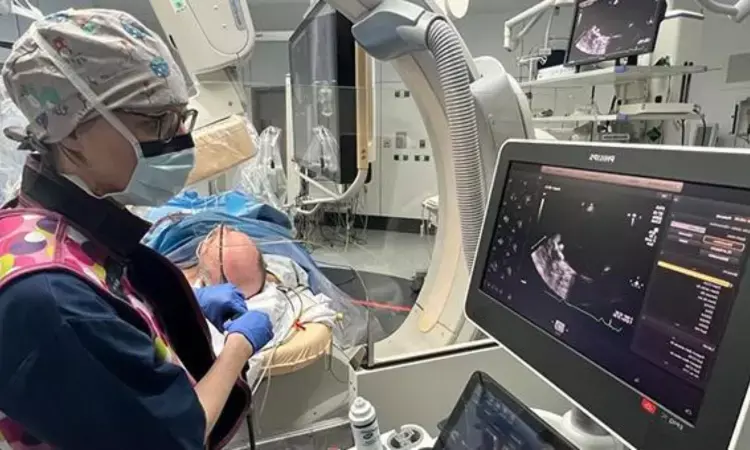- Home
- Medical news & Guidelines
- Anesthesiology
- Cardiology and CTVS
- Critical Care
- Dentistry
- Dermatology
- Diabetes and Endocrinology
- ENT
- Gastroenterology
- Medicine
- Nephrology
- Neurology
- Obstretics-Gynaecology
- Oncology
- Ophthalmology
- Orthopaedics
- Pediatrics-Neonatology
- Psychiatry
- Pulmonology
- Radiology
- Surgery
- Urology
- Laboratory Medicine
- Diet
- Nursing
- Paramedical
- Physiotherapy
- Health news
- Fact Check
- Bone Health Fact Check
- Brain Health Fact Check
- Cancer Related Fact Check
- Child Care Fact Check
- Dental and oral health fact check
- Diabetes and metabolic health fact check
- Diet and Nutrition Fact Check
- Eye and ENT Care Fact Check
- Fitness fact check
- Gut health fact check
- Heart health fact check
- Kidney health fact check
- Medical education fact check
- Men's health fact check
- Respiratory fact check
- Skin and hair care fact check
- Vaccine and Immunization fact check
- Women's health fact check
- AYUSH
- State News
- Andaman and Nicobar Islands
- Andhra Pradesh
- Arunachal Pradesh
- Assam
- Bihar
- Chandigarh
- Chattisgarh
- Dadra and Nagar Haveli
- Daman and Diu
- Delhi
- Goa
- Gujarat
- Haryana
- Himachal Pradesh
- Jammu & Kashmir
- Jharkhand
- Karnataka
- Kerala
- Ladakh
- Lakshadweep
- Madhya Pradesh
- Maharashtra
- Manipur
- Meghalaya
- Mizoram
- Nagaland
- Odisha
- Puducherry
- Punjab
- Rajasthan
- Sikkim
- Tamil Nadu
- Telangana
- Tripura
- Uttar Pradesh
- Uttrakhand
- West Bengal
- Medical Education
- Industry
Which is better TTE or TEE for Grading RV Diastolic Dysfunction?

Assessing right ventricular diastolic function is crucial in cardiac surgery, as it significantly impacts long-term prognosis. Typically, RV diastolic dysfunction is evaluated using criteria from the American Society of Echocardiography (ASE) or the British Society of Echocardiography (BSE) via transthoracic echocardiography (TTE). Nevertheless, transesophageal echocardiography (TEE) is the primary method for perioperative evaluation during cardiac surgery. Recent study aimed to assess the agreement between transthoracic echocardiography (TTE) and transesophageal echocardiography (TEE) in grading right ventricular diastolic dysfunction (RVDD) using criteria from the American Society of Echocardiography (ASE) and the British Society of Echocardiography (BSE).
The study included 81 patients undergoing cardiac surgery. TTE and TEE measurements were taken within 10 minutes of each other, under similar hemodynamic, anesthetic, and ventilatory conditions. RVDD grading was performed separately using TTE, TEE mid-esophageal right ventricular inflow-outflow (MERVIO) view, and TEE deep transgastric right ventricular inflow-outflow (DTGRVIO) view, based on both ASE and BSE criteria. According to the ASE criteria, disagreement of ≥1 RVDD grade was seen in 53.1% of patients when comparing TTE and TEE-MERVIO, and in 39.5% when comparing TTE and TEE-DTGRVIO. The weighted kappa was 0.14 and 0.3, respectively, indicating poor to fair agreement. Using the BSE criteria, disagreement occurred in 11.1% and 14.8% of patients when comparing TTE with TEE-MERVIO and TEE-DTGRVIO, respectively, with unweighted kappa of 0.25 and 0.26, indicating fair agreement.
Limits of Agreement and Rater Consistency
The study found wide limits of agreement between individual 2D and Doppler parameters measured by TTE and TEE. There was almost perfect agreement between independent raters for RVDD grading using both TTE and TEE. In conclusion, the study revealed at best only fair agreement between TTE and TEE in grading RVDD. The authors recommend further research to develop a TEE-based algorithm for grading RVDD and to evaluate the prognostic effectiveness of perioperative TEE for predicting adverse clinical outcomes associated with RVDD.
Key Points
1. The study aimed to assess the agreement between transthoracic echocardiography (TTE) and transesophageal echocardiography (TEE) in grading right ventricular diastolic dysfunction (RVDD) using criteria from the American Society of Echocardiography (ASE) and the British Society of Echocardiography (BSE).
2. The study included 81 patients undergoing cardiac surgery, with TTE and TEE measurements taken within 10 minutes of each other under similar hemodynamic, anesthetic, and ventilatory conditions. RVDD grading was performed separately using TTE, TEE mid-esophageal right ventricular inflow-outflow (MERVIO) view, and TEE deep transgastric right ventricular inflow-outflow (DTGRVIO) view, based on both ASE and BSE criteria.
3. Using the ASE criteria, there was a disagreement of ≥1 RVDD grade in 53.1% of patients when comparing TTE and TEE-MERVIO, and in 39.5% when comparing TTE and TEE-DTGRVIO, with poor to fair agreement as indicated by the weighted kappa values.
4. Using the BSE criteria, disagreement occurred in 11.1% and 14.8% of patients when comparing TTE with TEE-MERVIO and TEE-DTGRVIO, respectively, with fair agreement as indicated by the unweighted kappa values.
5. The study found wide limits of agreement between individual 2D and Doppler parameters measured by TTE and TEE, but almost perfect agreement between independent raters for RVDD grading using both TTE and TEE.
6. The authors conclude that the study revealed at best only fair agreement between TTE and TEE in grading RVDD, and they recommend further research to develop a TEE-based algorithm for grading RVDD and to evaluate the prognostic effectiveness of perioperative TEE for predicting adverse clinical outcomes associated with RVDD.
Reference -
Singh N C, Biswas I, Kumar B, et al. (October 07, 2024) The Agreement Between Transthoracic and Transesophageal Echocardiography in the Assessment of Right Ventricular Diastolic Dysfunction Grades in Adult Patients Undergoing Cardiac Surgery: A Prospective Observational Study. Cureus 16(10): e70976. DOI 10.7759/cureus.70976
MBBS, MD (Anaesthesiology), FNB (Cardiac Anaesthesiology)
Dr Monish Raut is a practicing Cardiac Anesthesiologist. He completed his MBBS at Government Medical College, Nagpur, and pursued his MD in Anesthesiology at BJ Medical College, Pune. Further specializing in Cardiac Anesthesiology, Dr Raut earned his FNB in Cardiac Anesthesiology from Sir Ganga Ram Hospital, Delhi.


